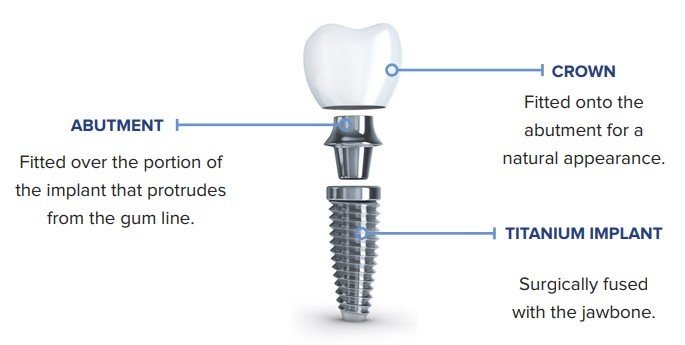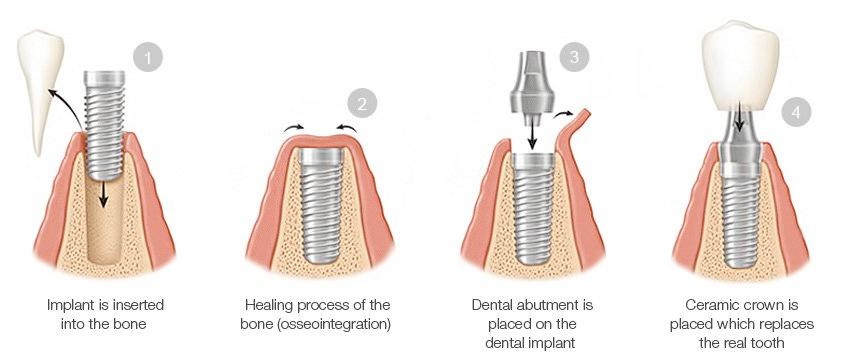Dental Implants in Manchester.
Replace missing teeth
Dental implants are simply the most effective way to replace missing teeth. From a single implant, to a bridge or a full arch of implants, any number of teeth can be repalced
For a long time the only way to replace teeth was with traditional fixed bridges which require tooth destruction or a removal denture. Patients would choose to avoid a removable denture and choose a fixed bridge. The tooth destruction required to place a bridge would often lead to additional tooth loss after an average of 10 years.
In the last 15 years dental implant technology has advanced and they are more predictable in outcome than they have ever been. The main advantage of a dental implant is that it is fixed in place and requires no reduction or destruction in any of the surrounding or opposing teeth.
We work closely with our implantologist, Dr. Arfeen Aslam to provide the best care for patients. Dr Aslam graduated from Guy’s, King’s and St Thomas’ School of Dentistry, King’s College London and obtained his membership of the faculty of the Royal College of Surgeons in 2012.
He has completed various postgraduate dental courses including a one year certificate in advanced aesthetic and restorative dentistry, followed by gaining recognition as a fully certified provider of a wide range of orthodontic treatments providing both fixed and removal cosmetic braces solutions. Arfeen has completed a year long programme in implant placement. He has a real passion for this field of dentistry.
Arfeen takes real pride and pleasure in his work. Along with a caring, ethical approach he strives to make a difference to each and every person that he treats. In recognition for the treatments he has provided, Arfeen won the prestigious Private Dentistry award as the Best Young Dentist North 2018.
A dental implant is a screw, usually made from titanium, that is used to replace the root of a missing tooth. The implant is screwed into the jaw where it provides a solid foundation for a crown, bridge or other dental prosthesis that replaces one or more missing teeth.

After an implant is placed, the surrounding bone will grow in contact with the implant surface and attach to it. This process of attachment is called ‘osseointegration.’ If osseointegration is not established or is lost, the implant will become loose and fail.
Implants are used to fix a crown, a bridge or a prosthesis that replaces one or more missing teeth. The aim is to improve your health, chewing function and/or aesthetic appearance.
It is difficult to give an exact price as each treatment plan is entirely unique. To give a base line figure, in 2023 patients who require a single dental implant with a crown, without any bone grafting can pay from £2300.
In order to provide an individual treatment plan we recommend a consultation where x-rays or a Cone beam CT Scan is taken to assess your current dental status. Following a consultation you will be provided with a written treatment plan which will outline the steps and cost to getting your dental implant.
To provide an approximate price range – a single dental implant starts from £2300. Implant retained dentures to replace all the teeth start from £4000 for the lower arch and £6500 for the upper arch. Costs and any additional charges will be discussed before you start the treatment and as the treatment progresses.
You are welcome to Contact Us with any questions related to costs or to arrange your consultation.
Alternatively, feel free to use the inquiry form at the bottom of this page and we would be happy to get back to you.
The additional factors which increase price include:
To improve affordability and to keep the price as low and cheap as possible a patient would have good bone volume and density and no complicating factors such as an infected tooth. With dental implants a lot of the cost goes into the components that are used. Dr Aslam only uses the best equipment and materials on the market and the top labs in the UK. Cheaper options may be available but costs savings are often made by using cheaper implant systems, components and dental labs.
There are 3 categories of patients who can potentially get dental implants on the NHS depending upon whether funding is granted at a hospital.
These categories are:

We work closely with our award-winning implantologist, Dr. Arfeen Aslam to provide the best care for patients. Dr Aslam graduated from Guy’s, King’s and St Thomas’ School of Dentistry, King’s College London and obtained his membership of the faculty of the Royal College of Surgeons in 2012. He has completed various postgraduate dental courses including a one-year certificate in advanced aesthetic and restorative dentistry, followed by gaining recognition as a fully certified provider of a wide range of orthodontic treatments providing both fixed and removal cosmetic braces solutions. Arfeen has completed a year-long programme in implant placement. He has a real passion for this field of dentistry.
Arfeen takes real pride and pleasure in his work. Along with a caring, ethical approach he strives to make a difference to each and every person that he treats. In recognition of the treatments he has provided, Arfeen won the prestigious Private Dentistry award as the Best Young Dentist North 2018.
You can also learn about our full team here.
There are several options for replacing a single tooth. Not all of them involve implants.
An implant can be placed into the gap left by a single missing tooth, and a crown can be fixed onto the implant.
Depending on the condition of the two adjacent teeth, they can be prepared to carry a bridge. The bridge is cemented onto the adjacent teeth and replaces the lost tooth.
A single tooth can also be replaced with a removable prosthesis. This is only done when other teeth in your mouth also have to be replaced using the same removable prosthesis.
No. An effective local anaesthetic is used before surgery, so no discomfort is felt as implants are placed. Any mild discomfort that may be experienced after surgery can be controlled with conventional painkiller tablets.
Natural teeth are surrounded by the periodontal ligament which enables sensations of pressure to be felt as we bite and chew. Implants are not surrounded by the periodontal ligament so the sensation of pressure may not be felt in quite the same way as by natural teeth.
Loss of one or more teeth in a segment of your mouth can lead to drifting of the neighbouring teeth. Similarly, loss of a tooth or teeth can lead to shifting of opposing teeth as they drift out (super-erupt) into the open space. In general, our teeth have a constant decency to move both towards the front of our mouths and towards the opposing jaw, unless they are stopped by something in their way – usually the adjacent or opposing teeth. Loss of teeth allows this to proceed. As teeth drift, they may create discrepancies in the height and contours of the gum tissue that predispose adjacent teeth to periodontal disease and/or dental decay from accumulation of plaque. Drifting teeth can also adversely affect the occlusion (bite), as well as the overall aesthetics of your face and smile. Dental implants can replace missing teeth and in this way may help preserve your remaining teeth.
Immediately after a tooth is removed, a blood clot forms in the socket. Over the following weeks, blood vessels and cells from the socket wall form bone, repairing the socket. At the same time, gingival cells migrate across the surface of the blood clot creating new gingiva and closing the extraction socket. Unfortunately, healing of the socket is normally associated with shrinkage and reduction of both bone and soft tissue. The extent of the tissue loss depends on a number of factors including your individual biology and the degree of tissue trauma during the removal of the tooth.
The loss of tissue following tooth extraction can be minimised by limiting the trauma to the bone and soft tissue, and by avoiding removal of bone during the extraction. Sometimes the empty socket is filled with a bone grafting material immediately after extraction to minimise loss of tissue.
Treatment is normally divided into two or three stages, each of which may involve several visits to your dentist.

Before implants can be placed, we need to sit down and discuss your needs, X-rays and impressions of your mouth may be needed. These allow us to plan the best way to treat you. You may require a cone beam CT scan and a small additional fee payable to CTDent who take CT scans on our behalf. Once these investigations are carried out, a treatment plan is proposed along with costing and alternative options.
The next stage of your treatment is to insert the implants. This is normally done under local anaesthetic (an injection which makes the area where we are working numb) by lifting the gum away from the underlying bone, then gently and carefully drilling into the jaw bone. The implant is inserted into the bone and the gum replaced and held together with some stitches. The stitches are removed about a week later.
Following insertion, some types of implant will stick out through the gum, whilst other types will be buried underneath the gum. The implants will usually be left for at least three months before they are used to support replacement teeth. Implants buried under the gum will require a second small surgical procedure to expose them before they can be used.
You will need a number of appointments to make your permanent crowns, bridges or implant retained denture. This will include taking impressions and checking the fit of the parts used to make your replacement teeth.
In total, depending upon complexity, treatment could extend over six to twelve months.
Several complications may be encountered, but they can all be managed effectively:
Dental implants are basically cleaned in the same way as your natural teeth. However, it is particularly important to clean in between the implants or between remaining teeth and implants. Special interdental brushes may be used to facilitate this, along with dental floss.
Generally, implants require a healing time of two to four months before placement of the prosthesis. Under specific circumstances and following well-established protocols, implants may be restored (have a prosthesis placed) on the same day, the implant is inserted. This is known as immediate loading.
Yes – although sports and other vigorous activities are best avoided for the first one to two weeks after surgery.